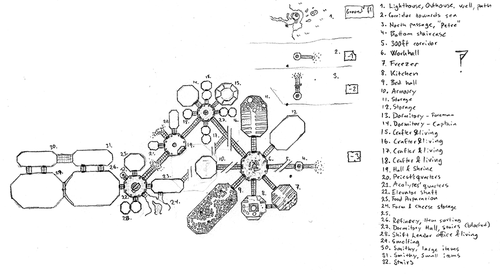Difference between revisions of "Khordaldrum"
| (2 intermediate revisions by the same user not shown) | |||
| Line 2: | Line 2: | ||
'''Khordaldrum''' was a [[Dwarf|dwarven]] stronghold before the [[Dragon Wars]] but was abandoned at some point during the war. The ruins of Khordaldrum have recently been rediscovered by an [[Elf|elven]]-led exploration under the [[Wellbarrow]] southern light house. | '''Khordaldrum''' was a [[Dwarf|dwarven]] stronghold before the [[Dragon Wars]] but was abandoned at some point during the war. The ruins of Khordaldrum have recently been rediscovered by an [[Elf|elven]]-led exploration under the [[Wellbarrow]] southern light house. | ||
The stronghold was made for | The stronghold was made for some sort of mining operations and had a large plantation of underground fungi and was the starting point of the famous and never finished [[Transit]]. It housed a large number of dwarves, considering the storage facilities and kitchen size. | ||
During the evacuation of the stronghold, a curse was laid upon it, preventing [[dragon]]s from entering, and it had a nasty effect on other creatures with dragon blood who entered. Some sort of illness spread, turning lizard-blooded kobolds into walking undead creatures, infecting other inhabitants entering the stronghold in the past few hundred years, including at least humans, troglodrakes and bugbears. | During the evacuation of the stronghold, a curse was laid upon it, preventing [[dragon]]s from entering, and it had a nasty effect on other creatures with dragon blood who entered. Some sort of illness spread, turning lizard-blooded kobolds into walking undead creatures, infecting other inhabitants entering the stronghold in the past few hundred years, including at least humans, troglodrakes and bugbears. | ||
Much of the ruins are cut off by cave-ins and require further exploration. | Much of the ruins are cut off by cave-ins and require further exploration. | ||
== Current inhabitants == | |||
Assortment of zombies, mainly kobold and troglodrakes. Also a large number of human (?) zombies. | |||
== Known previous inhabitants == | |||
* Dwarven | |||
** [[Thrar Quickhand]], Foreman, had a sword called Flesh Eater that was once magical (currently owned by a barbarian). | |||
Latest revision as of 21:04, 5 August 2016

Khordaldrum was a dwarven stronghold before the Dragon Wars but was abandoned at some point during the war. The ruins of Khordaldrum have recently been rediscovered by an elven-led exploration under the Wellbarrow southern light house.
The stronghold was made for some sort of mining operations and had a large plantation of underground fungi and was the starting point of the famous and never finished Transit. It housed a large number of dwarves, considering the storage facilities and kitchen size.
During the evacuation of the stronghold, a curse was laid upon it, preventing dragons from entering, and it had a nasty effect on other creatures with dragon blood who entered. Some sort of illness spread, turning lizard-blooded kobolds into walking undead creatures, infecting other inhabitants entering the stronghold in the past few hundred years, including at least humans, troglodrakes and bugbears.
Much of the ruins are cut off by cave-ins and require further exploration.
Current inhabitants
Assortment of zombies, mainly kobold and troglodrakes. Also a large number of human (?) zombies.
Known previous inhabitants
- Dwarven
- Thrar Quickhand, Foreman, had a sword called Flesh Eater that was once magical (currently owned by a barbarian).